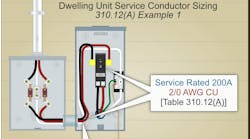Your plant bought a custom-built production machine from a machine rebuilder. There was considerable discussion before this purchase because, despite the 40% savings over a totally new machine, the fact many of its components were “recycled” from other machines concerned some people. After two years of service, many who were initially in favor of this purchase are having second thoughts.
The production machine has needed many replacement parts. Quite a few circuit boards, a motor drive, and three motors were among its victims. When it works, it works great. But due to these numerous failures, the downtime and the replacement parts have caused much of the cost savings has evaporated.
The plant engineer does not believe the machine is defective and has asked you to look into it. Where do you start?
First, look at how the builders “grounded” the electrical components. Are those “grounded” to the frame or is there a proper ground bus that connects to the equipment grounding conductor (EGC)? If the former, rewire it to be the latter. Ensure the EGC has continuity all the way to the service.
Next, review the maintenance procedures supplied by the rebuilder against recorded failure modes. Where a maintenance procedure does not exist for a given failure mode, determine what maintenance would be applicable. Evaluate existing procedures and update as needed.
Some of the failures are probably power related. Conduct a power quality analysis. Because you had three motor failures, focus on voltage imbalance (those three motors), low power factor, and excess third and fifth harmonics under varying conditions.
Finally, conduct a “conditions of use” review with the builder. Is your plant unusually hot, humid, or dirty? Is there anything else “rough duty” about your equipment use?




